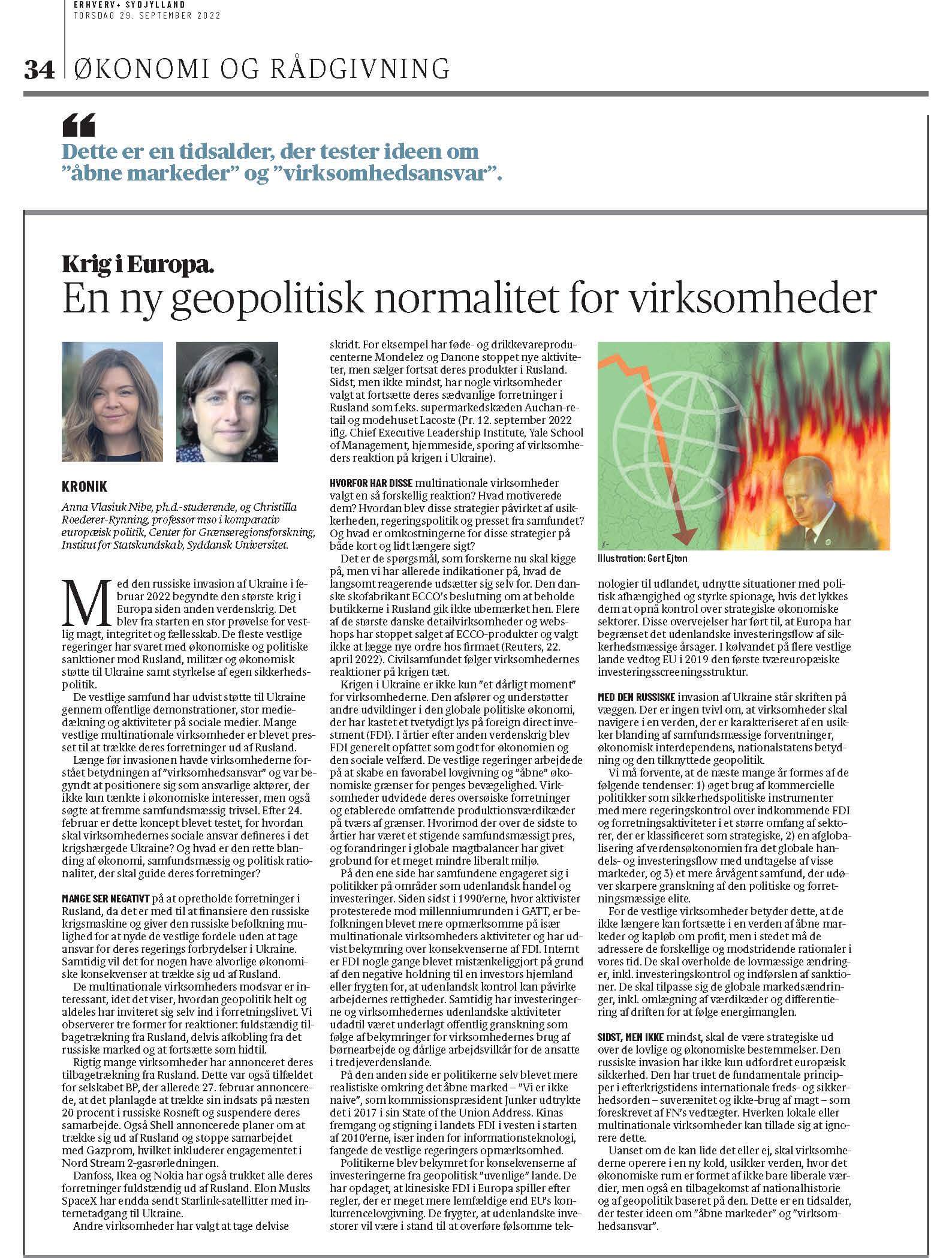‘Beauty Contests’ Publication in Danish Press: on the Russian war in Ukraine, Geopolitics, and Business

Anna Vlasiuk Nibe and Christilla Roederer-Rynning, a piece for Jysk Fynske Medier, Erhverv+
War in Europe: A new geopolitical normalcy for businesses
The Russian invasion of Ukraine in February 2022 started the biggest war in Europe since the WWII and posed the biggest test for the West’s power, integrity and unity. Most Western governments have responded with economic and political sanctions against Russia, military and financial support to Ukraine, and strengthening their own security policies. Western societies have demonstrated support to Ukraine through public demonstrations, broad media coverage and activities in social networks. Many Western multinational companies have been pressured to withdraw their business from Russia. Long before the invasion, businesses had embraced ‘corporate social responsibility’ positioning them as responsible actors acting beyond economic interest to promote wider societal wellbeing. Since February 24, this idea has been put to a test, for what is their social responsibility in war-ravaged Ukraine? And what proper mix of economic, social, and political rationalities should guide their operations? Continuing operations in Russia is seen negatively by many as it leads to financing the Russian war machine and allows the Russian population to enjoy western benefits without taking responsibility for their government’s crimes in Ukraine – at the same time, for some, withdrawing from Russia involves heavy economic costs.
The response of the multinationals is interesting because it shows how solidly geopolitics has invited itself into business life. We can observe three types of reactions: complete withdrawal from Russia; partial disengagement from the Russian market; and business as usual. Dozens of companies have announced their withdrawal from Russia. This was the case of BP, which already on 27 February announced its plans to exit its nearly 20% stake in Russian Rosneft and suspend their joint ventures. Similarly, Shell announced plans to get out of Russia, stop their joint ventures with Gazprom including the involvement into Nord Stream 2 gas pipeline. Danfoss, Ikea and Nokia have also withdrawn their business from Russia completely. Elon Musk’s SpaceX even sent Starlink satellite internet dishes to Ukraine. Other companies have chosen to take partial steps. For instance, food and beverage conglomerate Mondelez and Danone have stopped new investments, yet they continue selling their products in Russia. Finally, some companies have chosen to continue their business-as-usual in Russia, e.g. the supermarket chain Auchan-retail or fashion brand Lacoste.[1]
Why did these multinationals adopt such different responses? What motivated them? How did uncertainty, governmental policy, and civil society’s pressure affect these strategies? And how costly are these strategies in the short- and the medium-term? These are questions that researchers must now address, but we already have indications of what slow-movers are exposing themselves to.The decision of Danish shoemaker ECCO to keep its stores in Russia open did not stay unnoticed. Several Danish largest retailers and online shops have stopped sales of ECCO products and decided not to take new orders from the company (Reuters, April 22, 2022). Civil society is closely following business responses to the war.
The war in Ukraine is not just ‘a bad moment’ for business. It reveals and reinforces other developments in the global political economy, which have cast foreign direct investment (FDI) in an ambiguous light. For decades after WWII, FDI was generally considered good for the economy and social welfare. Western governments worked on creating favourable legislation and ‘open’ economic borders for capital flows. Companies extended their businesses overseas and established extensive production value chains across borders. In the last two decades, by contrast, growing social pressure and global power shifts have given rise to a much less permissive environment.
On the one hand, societies have engaged into the politics of foreign trade and investment. Since the late 1990s, when activists protested against the Millennium Round of the GATT, the public has become attentive to the particular activities of multinationalss, raising concerns over the implications of FDI. Inward FDI has sometimes been viewed with suspicion because of negative sentiment towards an investor’s country or fears that foreign control might affect employees’ rights. Simultaneously, the outward investments and firms’ activities abroad have been a matter of public scrutiny due to concerns over firms’ use of the child labour and poor working conditions for the employees in third world countries.
On the other hand, policymakers themselves have become more realist about open markets – ‘We are not naïve’, as Commission President Juncker puts it in his 2017 State of the Union Address. The rise of China and proliferation of its FDI in the West in early 2010s, particularly in informational technology, captured the attention of Western governments. Policymakers became concerned about the consequences of the investments from geopolitically ‘unfriendly’ countries. They have recognized that Chinese FDI into Europe plays by rules that are much more permissive than EU competition law, and they fear that, by gaining control over strategic sectors of economies, foreign investors have been able to transfer sensitive technologies abroad, exploit situations of political dependency, and consolidate espionage. These considerations have led Europeans to restrict foreign investment flows on security grounds . Following several countries in the West, the EU adopted the first pan-European investment screening framework in 2019.
With the Russian invasion of Ukraine, the writing is on the wall. There is little doubt that businesses must navigate a world characterized by an uneasy mix of societal expectations, economic interdependency, the return of national history, and associated geopolitics. We can expect that the next many years will be shaped by the following trends: 1) the wider securitization of commercial policies with more governmental control over inward FDI and business activities in an extended range of sectors deemed strategic; 2) the deglobalization of world economy with the exclusion of certain markets from the global trade and investment flows; and 3) more vigilant civil societies exercising more intense scrutiny on the political and business elites.
For western business, this means they can no longer exist within a usual paradigm of open markets and race for profits but must address the different and conflicting rationalities of our time. They need to comply with regulatory changes, including investment control and imposition of sanctions. They need to adapt to global markets changes, including restructuring of value chains and diversification of operations to address energy shortage. Finally, they need to be strategic beyond the legal and economic requirements. The Russian invasion has not only challenged European security. It threatened the fundamental principles of post-WWII international peace and security order – the sovereignty and non-use of force – stipulated by the UN Charter. Neither local nor multinational companies can afford to ignore this. Whether they like it or not, firms operate in a new cold uncertain world where the economic space is shaped not just by liberal values but also the return of national history, and of geopolitics based on it. This is a time of test for the notions of ‘open markets’ and ‘corporate social responsibility’.
[1] As of September 12, 2022, according to the Chief Executive Leadership Institute, the Yale School of Management, webpage, tracking business responses to the war in Ukraine: https://som.yale.edu/story/2022/over-1000-companies-have-curtailed-operations-russia-some-remain
The Danish version of this piece was published in Jysk Fynske Medier, Erhverv+, on September 29, 2022.





